As machine learning (ML) continues to evolve, the integration and management of ML models in production environments can become a significant challenge. MLOps, or machine learning operations, streamline these processes, ensuring efficient and reliable workflows. Below are 8 powerful open source MLOps tools that can help you optimize your ML workflows.
Best Open Source MLOps Tools for Production
- KitOps
- Kubeflow
- Seldon Core
- Cortex
- MLflow
- Metaflow
- MLRun
- Flyte
1. KitOps
KitOps is an innovative open-source project aimed at enhancing collaboration among data scientists, developers, and SREs managing AI/ML models. It offers a standard and versioned packaging system for AI/ML projects.

Key Features:
- Packages models, datasets, code, and configurations into an OCI-compliant ModelKit.
- Utilizes a YAML-based Kitfile for easy sharing of model, dataset, and code configurations.
- Provides a command-line interface (CLI) for managing ModelKits.
Why KitOps?:
- Standardizes and simplifies AI/ML model packaging and sharing.
- Supports existing container registries for seamless integration.
- Reduces tampering risks with immutable packaging.
Useful Links:
2. Kubeflow
Kubeflow is a comprehensive platform introduced by Google, designed for machine learning and MLOps on Kubernetes. It integrates all stages of the ML lifecycle, from development to deployment.
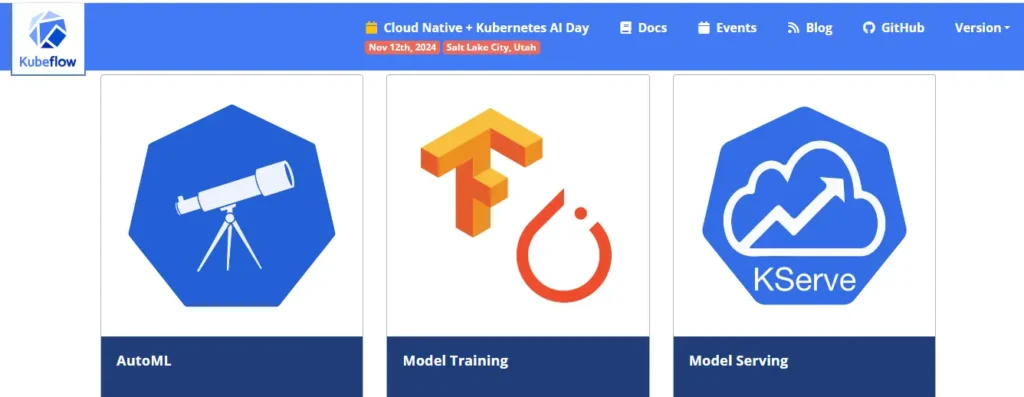
Key Features:
- Compatible with cloud services like AWS, GCP, and Azure.
- Centralized dashboard for monitoring and managing pipelines.
- Supports various AI frameworks for model training, fine-tuning, and deployment.
Why Kubeflow?:
- Seamlessly integrates with Kubernetes for scalable ML workflows.
- Provides robust tools for experiment tracking, model registry, and artifact storage.
Useful Links:
3. Seldon Core
Seldon Core is an open-source platform for deploying and managing machine learning models at scale. It provides a comprehensive set of tools for model serving monitoring and management.

Key Features:
- Supports various ML frameworks and models.
- Provides real-time model monitoring and management.
- Offers tools for A/B testing and model optimization.
Why Seldon Core?:
- Enables seamless deployment and scaling of ML models.
- Ensures robust monitoring and management of models in production.
Useful Links:
4. Cortex
Cortex is an open-source platform for deploying machine learning models. It focuses on simplicity and scalability, making it easy to deploy and manage models in production.

Key Features:
- Supports multiple ML frameworks and models.
- Provides a simple and scalable deployment process.
- Offers tools for model monitoring and versioning.
Why Cortex?:
- Simplifies the deployment process for ML models.
- Ensures scalability and robustness in production environments.
Useful Links:
5. MLflow
MLflow, developed by Databricks, is a powerful platform for managing the ML lifecycle, focusing on experiment tracking, reproducibility, and deployment.
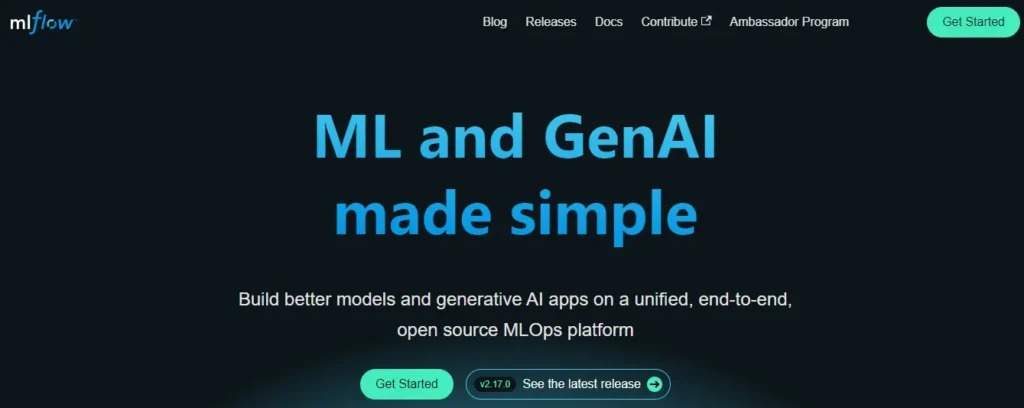
Key Features:
- Supports versioning and storing of parameters, code, metrics, and output files.
- Provides tools for packaging and deploying models.
- Centralized model registry for managing model lifecycle.
Why MLflow?:
- Comprehensive end-to-end solution for ML projects.
- Ensures reproducibility and traceability of experiments and models.
Useful Links:
6. Metaflow
Originally developed at Netflix, Metaflow is a human-friendly Python library that simplifies developing, deploying, and operating data-intensive applications.
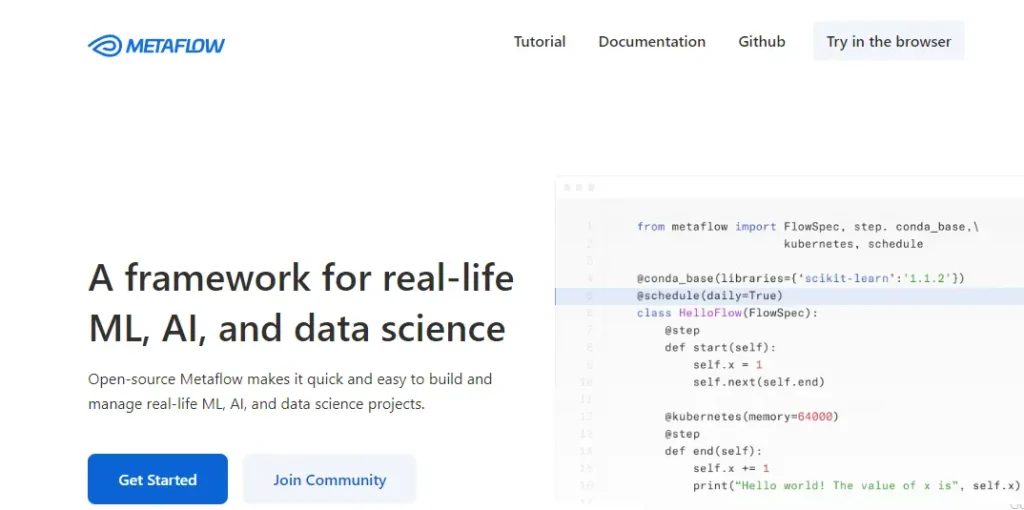
Key Features:
- Unified API for data management, versioning, orchestration, and model deployment.
- Compatible with major cloud providers and ML frameworks.
- Designed to boost productivity and scalability.
Why Metaflow?:
- Streamlines complex data workflows.
- Enhances productivity with a user-friendly interface and robust functionality.
Useful Links:
7. MLRun
MLRun is an open-source AI orchestration framework for managing ML and generative AI applications throughout their lifecycle.
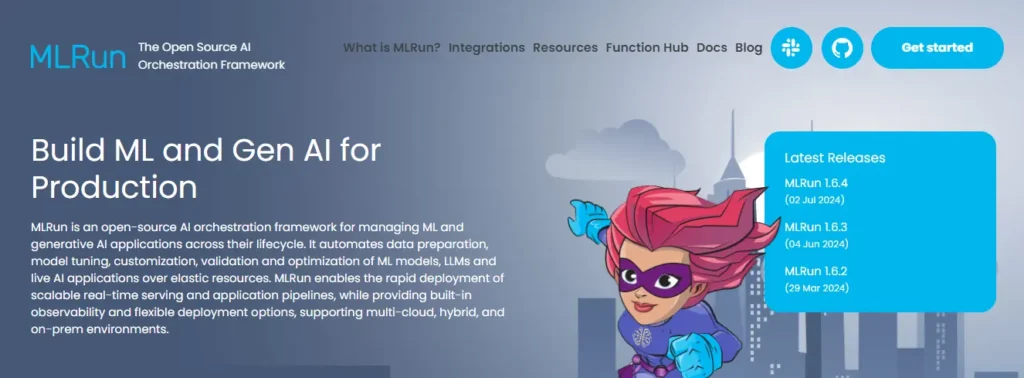
Key Features:
- Automates data preparation, model tuning, validation, and optimization.
- Supports multi-cloud, hybrid, and on-prem environments.
- Rapid deployment of scalable real-time serving and application pipelines.
Why MLRun?:
- Comprehensive lifecycle management for ML models.
- Built-in observability and flexible deployment options.
Useful Links:
8. Flyte
Flyte is a production-grade, extendable, and scalable ML framework supporting the creation and management of ML workflows at scale.
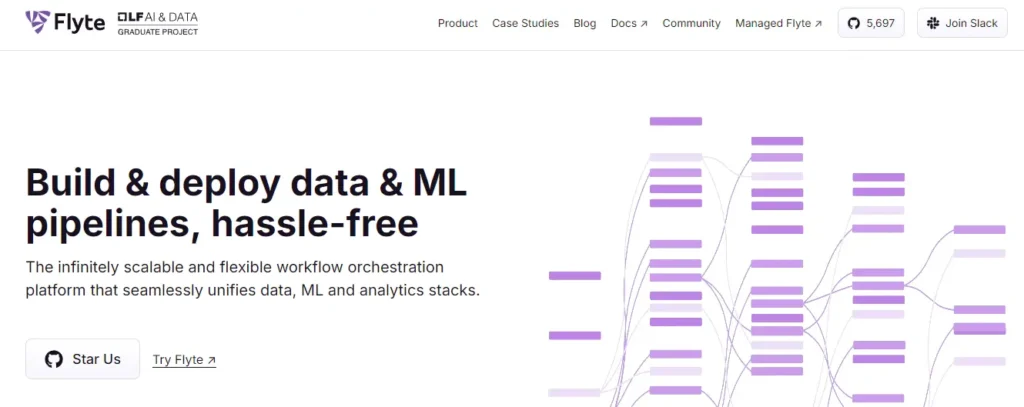
Key Features:
- Supports the orchestration and execution of complex ML tasks.
- Ensures models can handle production workloads.
- Integrates well with existing data science ecosystems.
Why Flyte?:
- Robust and scalable solution for ML workflows.
- Enhances collaboration and efficiency in model development and deployment.
By leveraging these tools, you can streamline your machine learning workflows, enhance collaboration across teams, and ensure that your models are reproducible, scalable, and production-ready. Each tool offers unique strengths, so evaluate them based on your specific project needs and infrastructure.